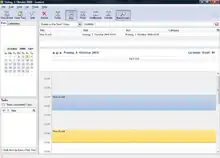Mozilla Sunbird
Mozilla Sunbird is a discontinued free and open-source, cross-platform calendar application that was developed by the Mozilla Foundation, Sun Microsystems and many volunteers.[3] Mozilla Sunbird was described as "a cross platform standalone calendar application based on Mozilla's XUL user interface language".[4] Announced in July 2003,[5] Sunbird was a standalone version of the Mozilla Calendar Project.
 Mozilla Sunbird main window running under Windows Vista | |
| Developer(s) | Mozilla Foundation and community |
|---|---|
| Final release | 1.0 Beta 1 (March 30, 2010) [±] |
| Preview release | 1.0 Beta 1 (March 30, 2010) [±] |
| Written in | C++, XUL, XBL, JavaScript |
| Operating system | Windows, Linux, BSD UNIX, OS X, Solaris, OpenSolaris and OS/2 |
| Available in | Multilingual,[1] EULA in English only[2] |
| Type | Personal information manager |
| License | MPL 1.1, MPL 1.1/GNU GPL/GNU LGPL tri-license |
| Website | www |
It was developed as a standalone version of the Lightning calendar and scheduling extension for the Mozilla Thunderbird and SeaMonkey mail clients. Development of Sunbird was ended with release 1.0 beta 1 to focus on development of Mozilla Lightning.[6][7] The latest development version of Sunbird remains 1.0b1 from January 2010, and no later version has been announced. Unlike Lightning, Sunbird no longer receives updates to its time zone database.
Sun contributions
Sun Microsystems contributed significantly to the Lightning extension project to provide users with a free and open-source alternative to Microsoft Office by combining OpenOffice.org and Thunderbird/Lightning.[8] Sun's key focus areas in addition to general bug fixing were calendar views, team/collaboration features and support for the Sun Java System Calendar Server.[9] Since both projects share the same code base, any contribution to one is a direct contribution to the other.
Trademark issues and Iceowl
Although it is released under a MPL, MPL/GPL/LGPL tri-license, there are trademark restrictions in place on Mozilla Sunbird which prevent the distribution of modified versions with the Mozilla branding.
As a result, the Debian project created Iceowl, a virtually identical version without the branding restrictions.
Release history
| Key: | ||
|---|---|---|
| Old Version | Current Version | Future Version |
| Gecko version | Sunbird version | Release date | Significant changes |
|---|---|---|---|
| 1.8 | 0.2 | February 4, 2005 | |
| 1.9 | 0.3 | October 11, 2006 | Calendar storage moved from flat .ICS files to SQLite |
| 0.3.1 | February 19, 2007 | Time zones updated for DST change | |
| 1.8.1 | 0.5 | June 27, 2007 | Moved to Gecko 1.8.1 for added stability and includes support for Google Calendar via an extension.[10] |
| 0.7 | October 25, 2007 | Cleaner user interface and additional functionality | |
| 0.8 | April 4, 2008 | International time zones, experimental offline support and task mode | |
| 0.9 | September 23, 2008 |
| |
| 1.9.1 | 1.0b1 | April 2, 2010 |
|
| 1.0b2 | June, 2010 |
See also
References
- "Sunbird - International Downloads". mozilla.org. Retrieved 2007-06-12.
- "Mozilla Sunbird End-User Software Licensing Agreement". mozilla.org. Retrieved 2007-06-12.
- Mozilla contributors list, Mozilla.org
- The Sunbird Project - Standalone Calendar - Main project page describing the project.
- Mozilla Sunbird Standalone Calendar Project Launches - MozillaZine Talkback - MozillaZine article announcing the Sunbird Project
- Sunbird 1.0 beta1 Release Notes: "This is the last public Sunbird release by the Calendar Project." Retrieved 2010-04-01.
- Calendar Project at a critical juncture Archived 2010-01-26 at the Wayback Machine, Calendar Weblog. Retrieved 2010-04-01.
- Paquet, Simon (2006-10-05). "Calendar Weblog". Weblogs.mozillazine.org. Archived from the original on 2010-02-12. Retrieved 2010-04-07.
- "Interview On Mozilla Lighting and". Openoffice.org. Retrieved 2010-04-07.
- Philipp Kewisch (2007-05-20). "Provider for Google Calendar". Mozilla. Retrieved 2007-06-29.
External links
- Official website
- MozillaWiki
- The Sunbird development blog
- Sunbird Portable by PortableApps.com
- Linux sunbird installer